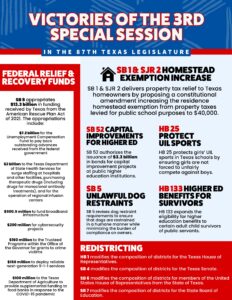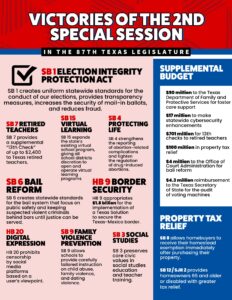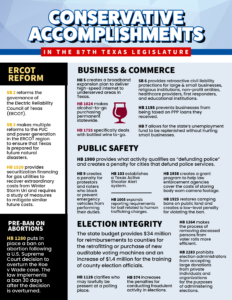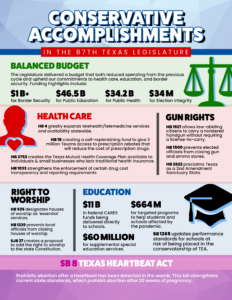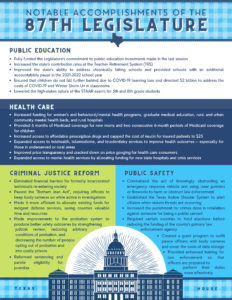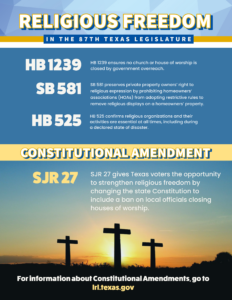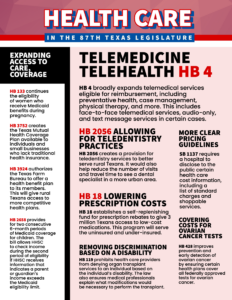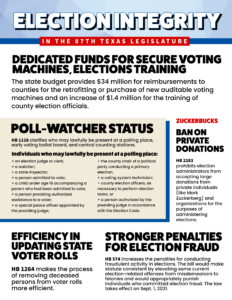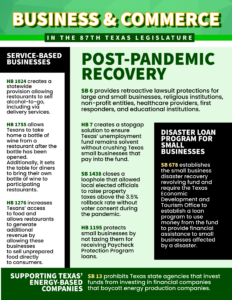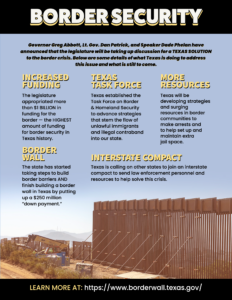A PRINCIPLED CONSERVATIVE,
ANDREW MURR IS DELIVERING RESULTS.
Representing nearly 15,000 square miles of rural Texas, Rep. Murr consistently fights to keep our local communities strong and protect our rural way of life. He knows it’s crucial that we keep up the fight to make Texas a better place for all Texans to live, work, and raise their families.
Representative Murr built on his track record of legislative success during the most recent legislative session and worked hard to ensure the voices of his constituents were heard in all parts of the legislative process. Below is more information about key budgetary items and legislation passed during the 87th Legislative Session.
RESULTS FROM THE 87TH SESSION
A Fiscally Conservative Budget
Public Education
Public Safety
Health and Human Services
Higher Education
More Funding
Public Education
- The state budget fully funds the state’s commitment to public education investments made in House Bill 3 from the 86th Legislature, with funding for projected enrollment growth during the 2022-23 biennium.
- Provides $464 million for increases to FSP formula funding and various student allotments.
- Provides $664 million for targeted programs to help students and schools affected by the pandemic.
- Provides $60 million for supplemental special education services.
- Restores funding for summer programs at the School for the Blind and Visually Impaired and the School for the Deaf.
- Provides $897.6 million, an increase of $39.5 million, to maintain current health insurance premiums and benefits for our retired teachers through TRS-Care.
- Provides $897.6 million to maintain current health insurance premiums and benefits for our retired teachers though TRS-Care (an increase of $39.5 million)
- Increases the state’s contribution rates at the Teacher Retirement System (TRS).
Public Safety
- $1.2 billion dedicated to border security efforts, including the deployment of 700 National Guard members, funding DPS operations on the border, and providing for surge operations when additional manpower is needed
- Provides $139.2 million for law enforcement salary increases at the Texas Department of Public Safety, Texas Parks and Wildlife Department, Texas Alcohol and Beverage Commission and other state commissioned law enforcement personnel.
- In addition to targeted salary increases for DPS troopers, the legislature provides funding for 100 new troopers along the border and 74 additional DPS troopers and staff to enhance the security throughout the Capitol complex.
- Includes $34.1 million for a 3% pay increase for correctional officers at the Texas Department of Criminal Justice working in maximum-security correctional facilities.
- Provides $57.6 million to combat human trafficking.
Health and Human Services
- Strengthens commitment to mental health services including:
- A total of $8.4 billion in behavioral health funding across 25 state agencies;
- An additional $30 million in GR for new rural and urban community mental health beds and an increase of $19.5 million for the Texas Child Mental Health Care Consortium; and
- An addition $86 million in GR for new state mental health hospital beds.
- Includes $352.6 million for women’s health programs, an increase of $10.2 million over current spending.
- Dedicates almost $100 million to alternatives to abortion
- Maintains the state’s ban prohibiting abortion providers from receiving state funds or participating in family planning and health care programs.
- Provides an additional $76.9 million to decrease the community waiver interest list for individuals with intellectual, developmental, and physical disabilities.
- Provides an additional $123.5 million for rural hospitals.
- Continues investments in Child Protective Services (CPS), with an additional $164.2 million to provide additional resources to lower CPS caseworker workloads; fund foster care lawsuit needs; expand Community-based care for foster children; and provide funding to increase capacity in the foster care system.
Higher Education
- Provides $8.6 billion – a $486 million increase to the current biennium – to fund higher education formulas.
- Bolsters Texas’ healthcare workforce by providing $199 million for graduate medical education to maintain a 1.1 to 1.0 ratio for residency slots, along with $118.5 million for the Texas Child Mental Health Consortium.
- Includes $1.25 billion for financial aid programs.
More Funding
- Provides $30.2 billion to the Department of Transportation, which includes $26.5 billion for highway planning and design, construction, maintenance, and preservation.
- Provides $4.2 million to enhance the Public Utility Commission and other regulatory response related to oversight of ERCOT activities.
- Provides $34 million for reimbursements to counties for the purchase of new auditable voting machines and an increase of $1.4 million for the training of county election officials.
- Provides the General Land Office and Veterans’ Land Board $3 billion for disaster recovery related to Hurricane Harvey, including $1.4 billion for short tern and community housing projects and $1.6 billion for infrastructure and mitigation projects; and $221.4 million for coastal projects.
Key Legislation
District Focus
Economic Development and Taxes
Second Amendment
Public Safety
Disaster Response
District Focus
- The 2023-2024 State Budget provides
- $6 Million to assist in rebuilding the historic Mason County Courthouse
- On February 4th, 2021, the 110-year old Mason County historical courthouse was tragically damaged in an act of arson.
- $6 Million to assist in rebuilding the historic Mason County Courthouse
- $400 Million to increase Texas’ Psychiatric Hospital System
- A portion of the appropriated funds will go towards the expansion of Kerrville State Hospital, which will add 70 new maximum-security beds to the existing facility.
- House Bill 365 by Murr – Expands the scope of liability limitation for Farm Animal Liability Act (FALA) to include routine/customary activities on a farm, the handling and managing of farm animals, and ranching activities. HB 365 would also further extend liability protections to routine management of farm and ranch livestock.
- House Bill 3584 – Stipulates that historical markers, monuments and medallions installed by the Texas Historical Commission (THC) are the sole property of the Commission and can only be altered or removed by the Commission. This bill ensures our heritage and history can be honored for future generations.
- HB 3584 is the only Republican Party platform priority bill regarding Monument Protection that passed this session.
- Senate Bill 1245 sponsored by Murr – Ensures that professionals and landowners have all of the necessary tools they need to properly fill out and complete the Farm and Ranch Survey. SB 1245 also provides for proper training and informational resources to ensure the best data possible is collected from the Farm and Ranch Survey.
Economic Development and Taxes
- SB 1 provides $30.2 billion to the Department of Transportation, which includes $26.5 billion for highway planning and design, construction, maintenance and preservation.
- HB 5 expands broadband services to rural and underserved areas across Texas.
- SB 13 prohibits state agencies that invest funds from investing in financial companies that boycott energy companies.
- HJR 99 proposes a constitutional amendment authorizing a county to finance the development or redevelopment of transportation or infrastructure in unproductive, underdeveloped, or blighted areas in the county; authorizing the issuance of bonds and notes. This innovative method of financing does not increase taxes, but allows local governments to redirect any additional property tax revenue to finance improvements in other areas, spurring economic development.
- HB 7 creates a stopgap solution to ensure Texas’ unemployment fund remains solvent without crushing Texas small businesses that pay into the fund.
- HB 1024 supports Texas’ vibrant restaurant scene by allowing restaurants to sell alcohol-to-go.
- HB 1195 protects small businesses by not taxing them for receiving Paycheck Protection Program loans.
- HB 1276 increases Texans’ access to food and allows restaurants to generate additional revenue by allowing these establishments to sell unprepared food directly to consumers.
- HB 1518 allows the sale of wine and beer at 10AM on Sundays by holders of the applicable permit, in addition to authorizing hotel bars to sell alcohol to registered guests at any time.
- HB 1505 creates the Broadband Pole Replacement Fund intended to provide eligible broadband facilities with funds to replace broadband poles to upgrade services statewide.
- HB 988 establishes a new process for property taxpayers to request binding arbitration to compel the appraisal review board or chief appraiser to comply with Tax Code requirements. The bill also guarantees an informal conference with the chief appraiser to any property owner who wants one, prohibits taxing units from inappropriately communicating with the appraisal district about property values, and provides added flexibility during disasters for an important goods-in-transit property tax exemption.
- HB 1869 prevents local governments from increasing property tax rates without voter approval when financing purchases with debt.
- HB 2723 improves the transparency provisions of S.B. 2 from last session by launching a statewide website at Texas.gov/PropertyTaxes, where property owners can easily find their local truth-in-taxation website as established by SB 2.
- SB 63 improves the appraisal review board and appraisal district board member selection process.
- SB 742 increases property tax payment flexibility by expanding the allowance for small businesses to pay their property taxes in four installments to property located in a disaster or emergency area but not damaged as a result of the disaster or emergency.
- SB 1438 reinforces the taxpayer protections added by SB 2 last session by preventing local governments from permanently increasing property taxes following a disaster.
- SB 1449 provides property tax relief to small businesses by increasing the business personal property exemption from $500 to $2,500.
- SB 938 supports new veteran-owned businesses by exempting these businesses from franchise taxes and business filing fees for the first five years the business is operating.
- SB 611 & SJR 35 provides additional property tax relief to veterans by expanding the residence homestead exemption for a surviving spouse of a member of the armed services.
- SB 794 expands the 100% homestead exemption for 100% or totally disabled veterans to all disabled veterans who have been awarded by (instead of receive from) the United States Department of Veterans Affairs 100 percent disability compensation.
Second Amendment
- HB 1927 allows permitless carry of a firearm for persons 21 years and older.
- HB 2622 makes Texas a 2nd Amendment Sanctuary State as a protection against federal overreach.
- HB 29 helps to address a problem for individuals licensed to carry a firearm — who in the past have had to leave their guns in their cars when going to certain public buildings — by authorizing secure weapon storage lockers to be placed in public buildings used by state agencies or political subdivisions.
- HB 781 allows public junior college school marshals to conceal carry handguns.
• HB 1407 protects the right of concealed-carry license holders to carry a gun holstered in their car or truck without keeping the holstered gun on their person.
• HB 1500 prohibits the suspension or limiting of the sale, dispensing, or transportation of firearms and ammunition during a declared disaster. - HB 2112 broadens protections for Texans carrying a handgun in a holster by expanding the definition to any type of holster, not just a shoulder or belt holster as statute currently states.
- SB 19 ensures that companies contracting with a state agency or political subdivision do not have an internal practice, policy, guidance, or directive that discriminates against a firearm entity or firearm trade association.
- SB 20 allows hotel guests to carry and store handguns or ammunition on hotel property.
- HB 957 removes firearm silencers from the list of prohibited weapons in the Penal Code and states that a firearm suppressor that was manufactured and remained in Texas would not be subject to federal law or federal regulation.
- HB 1069 allows first responders with a license to carry to defend themselves by allowing them to carry a handgun while on duty.
Public Safety
- HB 9 makes the action of knowingly obstructing the passage of an authorized emergency vehicle subject to criminal punishment.
- HB 103 establishes the Texas Active Shooter Alert System so citizens are made aware when violent threats are occurring.
- HB 624 increases the punishment for crimes done in retaliation on someone for being a public servant.
- HB 1900 provides corrective solutions for municipalities that do not appropriately fund their police.
- HB 1925 restores camping bans on public land and creates a low-level penalty for violating the ban.
- SB 15 limits state agencies’ ability to sell or disclose personal information to third parties, protecting consumer privacy.
- SB 23 requires certain counties to hold elections before reducing the funding of the county’s primary law enforcement agency or reallocating their funds.
- SB 24 requires law enforcement who hire police officers to go through a series of steps to check the backgrounds of those applying for jobs.
- HB 2366 enhances criminal penalties for the use of laser pointers and creates an offense for the use of fireworks to harm or obstruct the police.
- HB 315 allows honorably retired peace officers to purchase their uniforms.
• HB 1938 creates a grant program to equip peace officers who meet certain conditions with body worn cameras and defray the costs of data storage for recordings created with them. - HB 3712 provides enhanced training for law enforcement, thus strengthening public confidence in law enforcement and making certain that officers are supported and prepared to perform their duties affectively.
Disaster Response
- SB 1 provides:
- $4.2 million to enhance the Public Utility Commission and other regulatory response related to oversight of ERCOT activities.
- $3 billion for disaster recovery related to Hurricane Harvey, including $1.4 billion for short term and community housing projects and $1.6 billion for infrastructure and mitigation projects; and $221.4 million for coastal projects.
- $200 million to extend, improve and maintain coastal barriers, storm surge gates, seawalls and levees.
- HB 16 protects consumers from sky-high electric bills by banning the sale of wholesale indexed products to residential customers, which can leave them vulnerable to extreme fluctuations in electricity prices.
- HB 17 ensures homeowners, builders, and businesses have the ability to decide how best to meet their energy needs by preserving customer choice and access to energy sources in Texas.
- HB 1510 provides the funding mechanism necessary to ensure winterization of Texas’ power grids.
- HB 1520 provides securitization financing for gas utilities to recover extraordinary costs from Winter Storm Uri and requires a study of measures to mitigate similar future costs.
- SB 2 reforms the governance of the Electric Reliability Council of Texas (ERCOT), requiring every member of the governing body to be a Texas resident.
- SB 3 helps ensure the reliability and resiliency of the ERCOT Grid, making certain Texas is better prepared for future extreme weather emergencies by addressing some of the key issues that arose during and after Winter Storm Uri.
- SB 1343 provides flexibility to a county commissioners court to meet during a declared state of disaster or emergency to facilitate the deliberation of relevant public safety matters.
- SB 6 supports the health care providers, businesses and others who helped Texas fight the COVID-19 pandemic by giving them limited liability protection for their good faith efforts to follow health and safety protocols during the pandemic.
- SB 22 supports first responders and public safety employees by establishing COVID-19 as a presumptive illness for workers’ compensation and other benefits for detention officers, corrections employees, firefighters, peace officers, and EMTs.
- HB 2073 requires that peace officers, emergency medical technicians, and professional firefighters be placed on paid leave by the political subdivision that employs them if they are ordered to quarantine or isolate due to an on-duty exposure to a communicable disease.
- HB 2211 supports Texas families by prohibiting hospitals from restricting patient visitation in certain disasters.
- SB 25 empowers residents of long-term care facilities with the right to designate an essential caregiver with whom a facility could not prohibit in-person visitations.
- SB 572 allows clergy members to visit hospital patients during a disaster, emergency, or epidemic.
- SB 969 improves the collection and dissemination of data related to a public health emergency, requiring the Department of State Health Services to make all available health data publicly available on its website in an easy-to-read format.
- SB 984 improves planning for future health emergencies and ensures that certain public health data is being accurately reported and communicated between hospitals, trauma service area regional advisory councils and the state.
- SB 1876 ensures patients with end-stage renal disease have access to needed dialysis care during times of an emergency.
